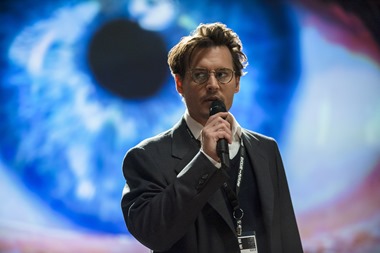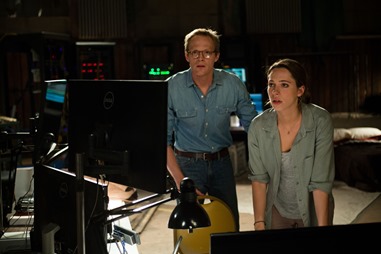In Transcendence, the wife and colleague of a dying man attempt to upload his consciousness into supercomputer AI with less than optimum results in a story bookended by a quiet, post-internet post-apocalypse world.
Wally Pfister could have chosen to play it safer for his directorial debut, but instead, he filmed Transcendence – a script by a first-timer, Jack Paglen. It’s a film that tries to do too many things – debate the nature of consciousness/self-awareness; deal with the ethical/moral responsibilities of creating a self-aware Artificial Intelligence that can experience genuine emotions; be an action film, and create a relatable romance. It’s beautifully shot, well-acted and has a wealth of great effects (and a few cheesy ones, but in trying to do so many things, it never really focuses on any one of them. The result is a film that is pretty awful.
Dr. Will Caster (Johnny Depp), his wife, Evelyn Caster (Rebecca Hall) and their colleague and best friend, Dr. Max Waters (Paul Bettany) are among the world’s leaders when it comes to creating an A.I. – an apparently sentient supercomputer program called PINN. When Will appears at a TED-like symposium, he is shot by someone from an anti-A.I. group called RIFT – which we soon learn is run by a rather creepily intense young woman named Bree (Kate Mara).
At the moment Will was shot, a number of A.I. labs and research facilities were attacked and Will’s one-time mentor, Dr. Joseph Tagger (Morgan Freeman) was among the few survivors.
At first, Will seems to come out the experience relatively well, but before he becomes ill – and we learn he’s suffered polonium poisoning. At best, he’s got five weeks to live. In the meantime, an FBI agent named Buchanan (Cillian Murphy) is trying to track down members of RIFT.
In an attempt to save Will, Evelyn and Max shut down PINN and use it as a base into which they upload Will’s mind. Up until then, Transcendence is reasonably intriguing. Then Will begins to expand his reach, moving out into the internet – one fringe benefit of which is amassing a fortune for Evelyn to use to buy a small town and build an underground facility to house the ever-expanding supercomputer that houses Will’s mind.
Things begin to get dicey when Will expands his cope in unusual ways – perfecting nanotechnology to save an injured contractor, but linking the man to the machine, and giving Will the ability to take over the man’s body. In the meantime, Bree and her followers kidnap Max. Since he worked on PINN, they hope to persuade him to create a virus that can shut Will down.
One of the biggest problems with Transcendence is that it tries to do so many things that we never see any one of them fully realised. Will and Evelyn’s relationship is barely sketched in when he dies and once his mind is in the computer, he’s discovering the joys of access to every piece of information in the world, while she really has little believable interaction with him.
To underscore the irony of the change in their relationship, there’s a moment when Will recreates their home in the underground facility and plays a song to make her feel at home. As she enters the room, the first line of the song, ‘The time has come for us to part,’ is followed by him intoning, ‘welcome home.’ It’s not just ironic (and all kinds of foreshadowing), it’s about as ham-fisted a moment as you can imagine, given the circumstances of the moment (it feels like Paglen and Pfister are yelling, ‘HEY! IRONY!’) and the film begins its slow slide straight to hell.
When Will begins to bus people in to use nanotechnology to heal them (a man who was born blind is given sight; a wheelchair-bound man is able to get up and walk), the film makes it seem, on the surface at least, that he is a potential savior. At the same time, everyone he’s helped is now linked to him, so an argument can be made for him raising an army to further his work (which may not be as benevolent as it seems on the surface).
Now we’re into the debate on whether the A.I. is actually Will, or simply a sentient machine that used Will’s memories to create its own world. The film is ambivalent – it tries hard to be balanced in its depiction of the A.I. Will, at the same time it treats Bree’s RIFT as both villains and heroes for their opposition to A.I. technology and their efforts to destroy the Will A.I.
The sci-fi elements of Transcendence – the creation of an A.I.; the uploading of a person’s mind/self into a computer; the miraculous nanotechnology – are based on an extrapolation current technology, and are used to ask questions that as yet have no definitive answer.
Evelyn, and to a lesser extent, Will exist to put forward the argument in favor of these lines of research and invention. Max is there to play devil’s advocate. The character of Dr. Tagger is there to look at both sides of that debate. Bree and RIFT exist to argue against.
Because none of the core characters are really developed to any great extent, the ambiguity of the film feels like a tease. The superb cast transcends the material, but the film fails because it’s trying so hard to say stuff that it winds up being a Big Ideas film that has no idea how to deal with those Big Ideas.
Despite giving a superb cast half-baked characters to play – and attempting to tackle the issue of technological progress with insufficient moral/ethical development – and resorting to action film moves instead of wit, Transcendence almost works. Unfortunately, whole is considerably less than the sum of its parts – and striking out with a big swing is still striking out.
When the film ended, I was about to say to my sister (one of the world’s biggest Johnny Depp fans), ‘That was terrible,’ when she looked at me and said, ‘That was terrible.’ And it really, really was.
Final Grade: D+
Photos courtesy of Warner Brothers.


